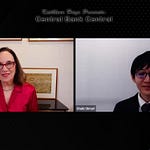Jason Schenker sees plenty of good news for the labor market in the November employment report starting with a larger-than-forecast payrolls gain of 227,000 and upward revisions in the three previous months — but not so good that it will prevent the Federal Reserve from doing its fourth rate cut of the year at its final meeting of 2024.
”There's, of course, the 56,000 upward revisions in (payrolls in three) prior reports, but there's still kind of a deficit from that October number when there were multiple hurricanes and strikes weighing on those payrolls,” the President and Chief Economist of Prestige Economics says.
”So what this does tell us, given that relatively weaker 3-month moving average? It tells us that we are in a spot where we're still seeing payrolls added, but it's been slowing, and that's something the Fed's been keeping an eye on.”
Notably the unemployment rate ticked up from 4.1% to 4.2%, underscoring, as Jason puts it, “just kind of this cooling in the labor force even though there's still lots of open jobs and positive payrolls.
”This, I think, is probably a best case scenario for financial investors and for markets who were hoping for. They don't want to see a recession. Right. I don't want to see a massive slowdown, but I also want interest rate cuts. If that's what you're hoping for, this was the report for you.
As for the state of the labor market, and the economy broadly, we dug deep into some key factors driving it now. Have a look and a listen.
Swift, decisive win in presidential race boosted employer, business confidence
00:08:51:01
“That's something that I think has instilled a great deal of confidence in employers and businesses, and I think that's even above any expectations around tax policy or the economy. The fact. that the election was decided swiftly, decisively, that it was so quick and so clean. I think that that is partially why I think that's the main factor. Why equity markets have surged so much, and why there's now economic optimism. Because we've put this period of uncertainty behind us.”
Shortage of workers to fill in-person, physically-demanding jobs like construction highlights need for immigration reform
00:12:49
…if we don't have the people to do these jobs, the prices of everything goes up…That creates a lot of cost pressure. If we're wondering how can we address some of the inflation risks, well, we need potentially more people in these sectors with more legal means to get folks into these sectors.
(Jason mentioned this CSIS article that he co-authored:
Immigration Policy Solutions to Shortages in Critical Sectors of the U.S. Economyhttps://www.csis.org/analysis/immigration-policy-solutions-shortages-critical-sectors-us-economy)
Above-target inflation and further upticks early next year due to “base effects” won’t stop Fed from cutting key rate in December, or rule out further cuts next year
In-depth explanation starts around 00:17:08
We covered a lot more ground including his analysis of the potential impact of tariffs on U.S. inflation - not his biggest worry - and the effect of sticky shelter costs which are a bigger concern.
So have a look and a listen. Jason is also Chairman of the Futurist Institute so you’ll definitely want to hear his thoughts on what’s ahead for the Fed, the economy, and inflation.
Chairman of The Futurist Institute, President of Prestige Economics
Jason Schenker is a futurist, economist, and author who prepares leaders for the future.
Jason has given over 1,200 keynote speeches on economic, financial market, and technology topics, including commodities, supply chain, futurist innovation, artificial intelligence (AI), the metaverse, quantum computing, energy and sustainability, geopolitics, demographics, and other topics. Jason has given speeches to public and private companies, industry groups, institutional investors, central banks, the U.S. State Department, the CIA, NATO, and global financial exchanges.
Jason's speeches focus on the economy, financial markets, commodities, supply chain, futurist innovation and technology, artificial intelligence (AI), the metaverse, quantum computing, energy and sustainability, geopolitics, demographics, and other trends.
Jason is currently a LinkedIn "Top Voice." Additionally, LinkedIn recognized Jason as a “Top Public Speaking Voice” and "Top Economics Voice" in 2023 and 2024.
Over 1.2 million students have taken Jason's 40 LinkedIn Learning courses on business, leadership, economics, risk management, and finance. He is the author of 36 books on emerging technologies, finance, energy, leadership, economics, finance, and supply chain. Jason has also been an occasional columnist for Bloomberg Opinion.
As President of Prestige Economics, Bloomberg News has ranked Jason #1 forecaster in the world in 27 different categories since 2011, including for oil prices, industrial metals prices, the euro, the British pound, agricultural commodity prices, gold prices, and U.S. jobs.
As Chairman of The Futurist Institute, Jason trains leaders to Become a Futurist®, including consulting, accounting, finance, and national security professionals.
Jason is also Chairman of the Climate Change Advisory Panel at Sasol (NYSE: SSL), the large public fuels and chemicals company headquartered in South Africa. This is an independent advisory board focused on supporting Sasol sustainability and emissions reduction commitments.
Jason is one of the 100 CEOs on the non-partisan Texas Business Leadership Council (TBLC), the Texas affiliate of the Business Roundtable that advises elected officials of both parties at the state and federal levels. He is on the TBLC Executive Committee, Economic Development Task Force, and Federal Issues Task Force.
Jason is also a member of the Bretton Woods Committee (BWC), a Fellow of the Energy Institute, and a Board Leadership Fellow of the National Association of Corporate Directors (NACD).
Jason is the author of 36 books, and fifteen have been #1 bestsellers on Amazon, including Jobs for Robots, Futureproof Supply Chain, The Future of Finance is Now, The Future of Energy, and The Robot and Automation Almanac. National Intelligence University Press published Jason’s peer-reviewed article on supply chain and national security in 2022.
Before founding Prestige Economics in 2009, Jason was a Risk Specialist at McKinsey and Chief Energy and Commodity Economist at Wachovia (Wells Fargo).
Jason holds a Master’s in Applied Economics from UNC Greensboro, a Master’s in Negotiation, Conflict Resolution, and Peacebuilding from CSU Dominguez Hills, a Master’s in Germanic Languages and Literature from UNC Chapel Hill, and a Bachelor’s in History and German from The University of Virginia. He has earned over a dozen professional certificates and certifications, including the FLTA® (Certified Futurist and Long-Term Analyst), CFP® (Certified Financial Planner), CMT® (Chartered Market Technician), ERP® (Energy Risk Professional), and SCR® (Sustainability and Climate Risk).
Jason is currently an Adjunct Fellow for the Center for Strategic and International Studies (CSIS). He was a 2023-2024 Non-Resident Fellow of the U.S. Joint Special Operations University at the U.S. Special Operations Command (USSOCOM).













Share this post